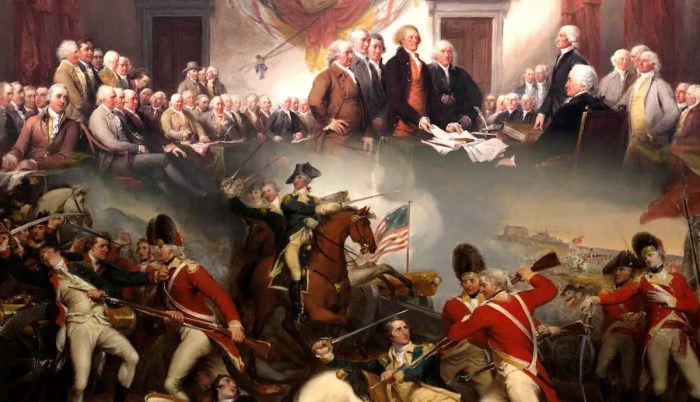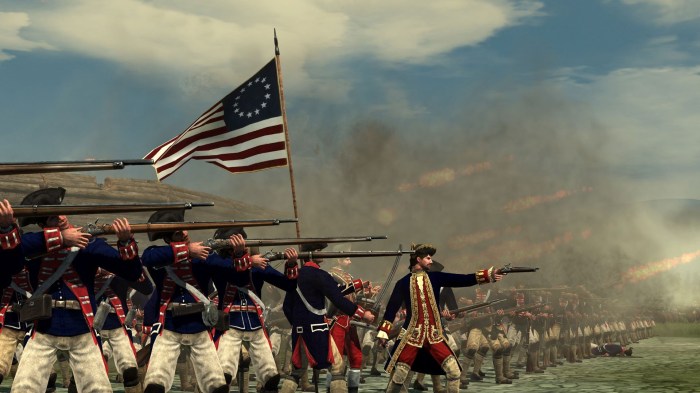How revolutionary was the american revolution dbq – The American Revolution, a pivotal event in world history, has been the subject of extensive debate regarding its transformative impact. This essay delves into the complexities of the revolution, exploring its ideological foundations, political and economic factors, military campaigns, and far-reaching implications.
Through a rigorous examination of historical documents and scholarly perspectives, this analysis aims to provide a comprehensive understanding of the American Revolution and its profound influence on American society and the global stage.
Defining the American Revolution: How Revolutionary Was The American Revolution Dbq

The American Revolution was a pivotal historical event that marked the birth of the United States of America and significantly altered the course of global politics. The revolution was a complex and multifaceted phenomenon that encompassed political, economic, ideological, and social dimensions.
Historical Context and Significance
The American Revolution was the culmination of a series of events and grievances that had been simmering in the American colonies for decades. The British government’s policies of taxation without representation, the imposition of trade restrictions, and the denial of basic rights and liberties to colonists all contributed to the growing discontent.
The revolution was a watershed moment in American history, leading to the establishment of a new nation based on the principles of democracy, self-governance, and individual liberty.
Key Events and Turning Points
The American Revolution was a gradual process that began with protests and petitions and escalated into armed conflict. Key events included the Boston Tea Party (1773), the Battle of Lexington and Concord (1775), the Declaration of Independence (1776), and the surrender of British forces at Yorktown (1781).
Ideological Foundations

The American Revolution was deeply influenced by the Enlightenment ideas that emphasized the importance of reason, individual rights, and the social contract.
Enlightenment Ideas
The Enlightenment thinkers such as John Locke, Jean-Jacques Rousseau, and Montesquieu believed in the natural rights of man, including the right to life, liberty, and property. They also argued that governments should be based on the consent of the governed and that the people have the right to overthrow a tyrannical government.
Role of Natural Rights, Individual Liberty, and Self-Governance
These Enlightenment ideas resonated with the American colonists, who saw themselves as victims of British tyranny. The colonists argued that they had the natural right to govern themselves and that the British government was violating their rights by imposing taxes without their consent and denying them representation in Parliament.
Political and Economic Factors
Political and economic grievances played a significant role in fueling the American Revolution.
Political Grievances
The colonists were dissatisfied with the British government’s policies of taxation without representation, the imposition of trade restrictions, and the denial of basic rights and liberties. They believed that they were being treated as second-class citizens by the British government and that they deserved to have a say in how they were governed.
Economic Tensions
The colonists were also facing economic hardships due to British policies. The British government’s mercantilist policies restricted the colonists’ ability to trade with other countries and limited their economic opportunities. The colonists also resented the British government’s monopoly on the sale of certain goods, such as tea, which they believed was driving up prices.
The War for Independence
The American Revolution was a military conflict that lasted from 1775 to 1783. The Continental Army, led by George Washington, fought against the British forces led by General William Howe and General Henry Clinton.
Military Campaigns and Battles, How revolutionary was the american revolution dbq
The war was fought on land and sea, with major battles taking place at Lexington and Concord, Bunker Hill, Saratoga, and Yorktown. The Continental Army was outnumbered and outgunned by the British, but they were able to win several key battles and ultimately secure their independence.
Strategies, Tactics, and Leadership
The Continental Army used a variety of strategies and tactics to defeat the British, including guerrilla warfare, hit-and-run attacks, and the use of fortifications. George Washington was a skilled military leader who was able to inspire his troops and keep them fighting despite the odds.
Declaration of Independence
The Declaration of Independence was a landmark document that declared the American colonies’ independence from Great Britain. It was adopted by the Continental Congress on July 4, 1776, and it has become a symbol of American independence and democracy.
Significance and Impact
The Declaration of Independence was a powerful statement of the colonists’ grievances against the British government and their determination to be free. It also Artikeld the principles upon which the new nation would be founded, including the natural rights of man, the right to self-government, and the consent of the governed.
Key Principles and Ideas
The Declaration of Independence contains several key principles and ideas, including:
- All men are created equal and have the natural rights of life, liberty, and the pursuit of happiness.
- Governments are instituted to protect the rights of the people.
- The people have the right to alter or abolish a government that is not protecting their rights.
Impact on American Society

The American Revolution had a profound impact on American society, leading to the creation of a new nation, the establishment of a democratic government, and the expansion of individual rights.
Creation of a New Nation
The American Revolution resulted in the creation of a new nation, the United States of America. The new nation was based on the principles of democracy, self-governance, and individual liberty.
Establishment of a Democratic Government
The American Revolution led to the establishment of a democratic government in the United States. The new government was based on the principles of popular sovereignty, the separation of powers, and the rule of law.
Expansion of Individual Rights
The American Revolution also led to the expansion of individual rights in the United States. The Bill of Rights, which was adopted in 1791, guaranteed the rights of free speech, religion, and assembly, as well as the right to a fair trial and the right to bear arms.
Global Implications
The American Revolution had a significant impact on the world, inspiring other revolutions and spreading the ideals of democracy and self-governance.
Spread of Revolutionary Ideas
The American Revolution inspired other revolutions around the world, including the French Revolution and the Haitian Revolution. The American Revolution also helped to spread the ideals of democracy and self-governance, which became the basis for many new governments around the world.
Inspiration for Independence Movements
The American Revolution also inspired independence movements in other countries, such as Latin America and Africa. The American Revolution showed that it was possible for a colony to break away from its mother country and establish its own independent government.
FAQ Explained
What were the primary causes of the American Revolution?
Political grievances, economic tensions, and the desire for self-governance were the primary catalysts for the revolution.
How did the Enlightenment influence the American Revolutionaries?
Enlightenment ideas, emphasizing natural rights, individual liberty, and limited government, deeply influenced the revolutionary ideology.
What were the key turning points in the American Revolutionary War?
Battles such as Bunker Hill, Saratoga, and Yorktown were decisive turning points in the conflict.
How did the American Revolution impact American society?
The revolution led to the creation of a new nation, the establishment of a democratic government, and the expansion of individual rights.